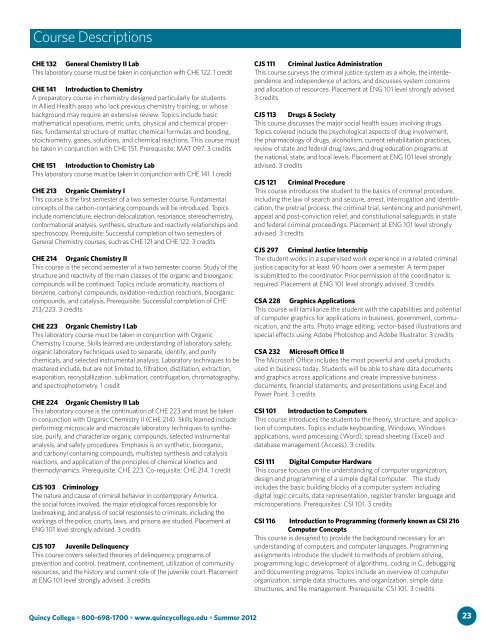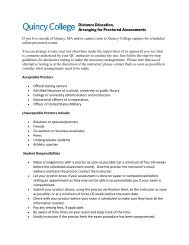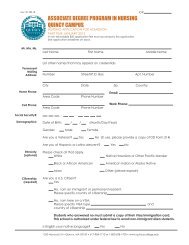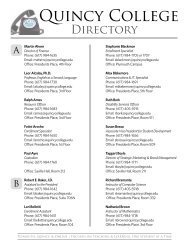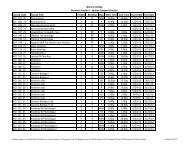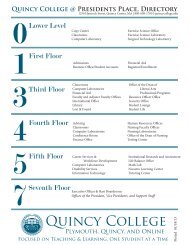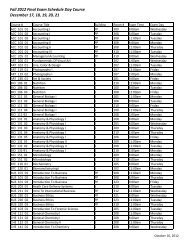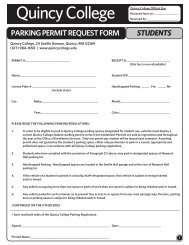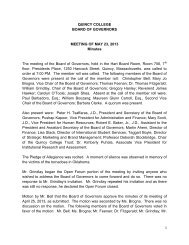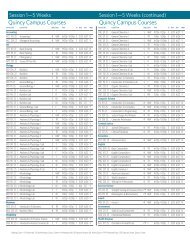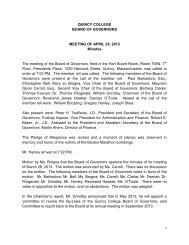Quincy College
Quincy College
Quincy College
Create successful ePaper yourself
Turn your PDF publications into a flip-book with our unique Google optimized e-Paper software.
Course Descriptions<br />
CHE 132 General Chemistry II Lab<br />
This laboratory course must be taken in conjunction with CHE 122. 1 credit<br />
CHE 141 Introduction to Chemistry<br />
A preparatory course in chemistry designed particularly for students<br />
in Allied Health areas who lack previous chemistry training, or whose<br />
background may require an extensive review. Topics include basic<br />
mathematical operations, metric units, physical and chemical properties,<br />
fundamental structure of matter, chemical formulas and bonding,<br />
stoichiometry, gases, solutions, and chemical reactions. This course must<br />
be taken in conjunction with CHE 151. Prerequisite: MAT 097. 3 credits<br />
CHE 151 Introduction to Chemistry Lab<br />
This laboratory course must be taken in conjunction with CHE 141. 1 credit<br />
CHE 213 Organic Chemistry I<br />
This course is the first semester of a two semester course. Fundamental<br />
concepts of the carbon-containing compounds will be introduced. Topics<br />
include nomenclature, electron delocalization, resonance, stereochemistry,<br />
conformational analysis, synthesis, structure and reactivity relationships and<br />
spectroscopy. Prerequisite: Successful completion of two semesters of<br />
General Chemistry courses, such as CHE 121 and CHE 122. 3 credits<br />
CHE 214 Organic Chemistry II<br />
This course is the second semester of a two semester course. Study of the<br />
structure and reactivity of the main classes of the organic and bioorganic<br />
compounds will be continued. Topics include aromaticity, reactions of<br />
benzene, carbonyl compounds, oxidation-reduction reactions, bioorganic<br />
compounds, and catalysis. Prerequisite: Successful completion of CHE<br />
213/223. 3 credits<br />
CHE 223 Organic Chemistry I Lab<br />
This laboratory course must be taken in conjunction with Organic<br />
Chemistry I course. Skills learned are understanding of laboratory safety,<br />
organic laboratory techniques used to separate, identify, and purify<br />
chemicals, and selected instrumental analysis. Laboratory techniques to be<br />
mastered include, but are not limited to, filtration, distillation, extraction,<br />
evaporation, recrystallization, sublimation, centrifugation, chromatography,<br />
and spectrophotometry. 1 credit<br />
CHE 224 Organic Chemistry II Lab<br />
This laboratory course is the continuation of CHE 223 and must be taken<br />
in conjunction with Organic Chemistry II (CHE 214). Skills learned include<br />
performing microscale and macroscale laboratory techniques to synthesize,<br />
purify, and characterize organic compounds, selected instrumental<br />
analysis, and safety procedures. Emphasis is on synthetic, bioorganic,<br />
and carbonyl containing compounds, multistep synthesis and catalysis<br />
reactions, and application of the principles of chemical kinetics and<br />
thermodynamics. Prerequisite: CHE 223. Co-requisite: CHE 214. 1 credit<br />
CJS 103 Criminology<br />
The nature and cause of criminal behavior in contemporary America,<br />
the social forces involved, the major etiological forces responsible for<br />
lawbreaking, and analysis of social responses to criminals, including the<br />
workings of the police, courts, laws, and prisons are studied. Placement at<br />
ENG 101 level strongly advised. 3 credits<br />
CJS 107 Juvenile Delinquency<br />
This course covers selected theories of delinquency, programs of<br />
prevention and control, treatment, confinement, utilization of community<br />
resources, and the history and current role of the juvenile court. Placement<br />
at ENG 101 level strongly advised. 3 credits<br />
CJS 111 Criminal Justice Administration<br />
This course surveys the criminal justice system as a whole, the interdependence<br />
and independence of actors, and discusses system concerns<br />
and allocation of resources. Placement at ENG 101 level strongly advised.<br />
3 credits<br />
CJS 113 Drugs & Society<br />
This course discusses the major social health issues involving drugs.<br />
Topics covered include the psychological aspects of drug involvement,<br />
the pharmacology of drugs, alcoholism, current rehabilitation practices,<br />
review of state and federal drug laws, and drug education programs at<br />
the national, state, and local levels. Placement at ENG 101 level strongly<br />
advised. 3 credits<br />
CJS 121 Criminal Procedure<br />
This course introduces the student to the basics of criminal procedure,<br />
including the law of search and seizure, arrest, interrogation and identification,<br />
the pretrial process, the criminal trial, sentencing and punishment,<br />
appeal and post-conviction relief, and constitutional safeguards in state<br />
and federal criminal proceedings. Placement at ENG 101 level strongly<br />
advised. 3 credits<br />
CJS 297 Criminal Justice Internship<br />
The student works in a supervised work experience in a related criminal<br />
justice capacity for at least 90 hours over a semester. A term paper<br />
is submitted to the coordinator. Prior permission of the coordinator is<br />
required. Placement at ENG 101 level strongly advised. 3 credits<br />
CSA 228 Graphics Applications<br />
This course will familiarize the student with the capabilities and potential<br />
of computer graphics for applications in business, government, communication,<br />
and the arts. Photo image editing, vector-based illustrations and<br />
special effects using Adobe Photoshop and Adobe Illustrator. 3 credits<br />
CSA 232 Microsoft Office II<br />
The Microsoft Office includes the most powerful and useful products<br />
used in business today. Students will be able to share data documents<br />
and graphics across applications and create impressive business<br />
documents, financial statements, and presentations using Excel and<br />
Power Point. 3 credits<br />
CSI 101 Introduction to Computers<br />
This course introduces the student to the theory, structure, and application<br />
of computers. Topics include keyboarding, Windows, Windows<br />
applications, word processing (Word), spread sheeting (Excel) and<br />
database management (Access). 3 credits<br />
CSI 111 Digital Computer Hardware<br />
This course focuses on the understanding of computer organization,<br />
design and programming of a simple digital computer. The study<br />
includes the basic building blocks of a computer system including<br />
digital logic circuits, data representation, register transfer language and<br />
microoperations. Prerequisites: CSI 101. 3 credits<br />
CSI 116 Introduction to Programming (formerly known as CSI 216<br />
Computer Concepts<br />
This course is designed to provide the background necessary for an<br />
understanding of computers and computer languages. Programming<br />
assignments introduce the student to methods of problem solving,<br />
programming logic, development of algorithms, coding in C, debugging<br />
and documenting programs. Topics include an overview of computer<br />
organization, simple data structures, and organization, simple data<br />
structures, and file management. Prerequisite: CSI 101. 3 credits<br />
<strong>Quincy</strong> <strong>College</strong> • 800-698-1700 • www.quincycollege.edu • Summer 2012 23


